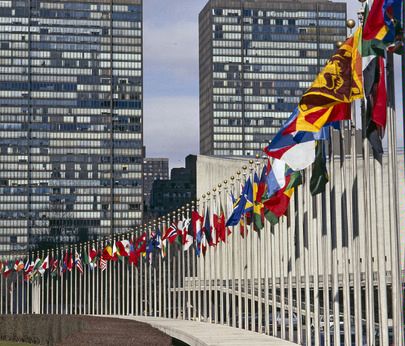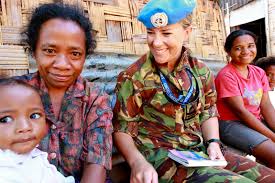On this page
World War II highlighted a pressing need for better world cooperation. While The League of Nations was created for this purpose after World War I it had proved ineffective. At a conference in San Francisco in October 1945, 50 nations hammered out a new charter for world relations. New Zealand played an active role in these negotiations including opposing the veto for the five permanent members (China, France, the Russian Federation, the UK and the US), advocating for collective security, and pushing for economic and social issues to be at the heart of the agenda. After fierce debate, the United Nations was born.

Today there are 193 members and the UN's work reaches into every corner of the globe. The UN charter allows it to take action on a wide range of issues that now extend well beyond international security to: the environment, disaster relief, disarmament, human rights, gender equality, food supply, health, refugee protection and other areas.
After a 10 year campaign New Zealand was voted onto the UN Security Council in 2014 and served two years in 2015 and 2016. Our seat on the Security Council placed New Zealand at the heart of international decisions on peace and security.
New Zealand’s policies
New Zealand used its seat on the UN Security Council to ensure the voice and interests of small countries continued to be heard in the debate around international security.
Our win proved small countries have a role to play at the UN and we were determined to represent the perspective of small states at the Security Council.
We continue to oppose the veto for any members on the Security Council.
We also believe the Security Council should place a greater emphasis on conflict prevention and resolution as proposed in Chapter 6 of the UN Charter. We advocate for more effort to be put into understanding and addressing the root causes of conflict.
How we work with the UN
MFAT has a UN office in New York – the Permanent Mission to the United Nations. We also have a Permanent Mission to the United Nations in Geneva that focuses on human rights, disarmament and other UN specialised agencies (such as those that deal with health, labour, refugees and humanitarian issues) and another in Vienna that works mainly on non-proliferation of weapons and arms control.
Permanent Mission staff act as liaison between UN officials and delegates, and MFAT back home. They promote New Zealand’s position on UN issues and put forward our views in negotiations, reports and activities. The Minister of Foreign Affairs and MFAT staff attend the UN General Assembly that takes place each year from September to December.
Our contribution to UN activities
Peacekeeping

New Zealand has contributed troops and personnel to UN peacekeeping operations since they began in 1948. We’ve been involved in more than 40 peace operations in more than 25 countries over the past seven decades, either under UN auspices or as part of coalitions. In peacekeeping duties we're known as collaborative, practical and respectful team players with a good understanding of multiculturalism and an easy rapport with local communities.
New Zealand has played a role in some of the UN's most challenging missions including those in Africa and the Middle East:
- UN Truce Supervision Organisation (UNTSO), working on peacekeeping in the Middle East, since 1954
- UN operations in Timor-Leste, former Yugoslavia, Somalia and Iraq
- Rwanda, Somalia, Mozambique, Angola and Sierra Leone in the 1990s
- UNMISS (South Sudan) since its establishment.
We have provided sustained contributions to other UN peace support operations, such as in Afghanistan (2001-2014), Bougainville (1990-2003), Korea (1950-ongoing), Solomon Islands (2003-2013) and in the Sinai Peninsula (1982-ongoing).
Read more about our peace support operations
Helping refugees
Conflicts and natural disasters have left more than 50 million refugees and internally displaced people in the world today. The Office of the United Nations High Commissioner for Refugees (UNHCR) is the lead agency for protecting refugees and the internally displaced (people forced from their homes but still living in their own country). Protection involves preventing the forced return of refugees to a country where they may have a well-founded fear of persecution, as under the 1951 Refugee Convention.
New Zealand contributes to this work in a number of ways:
- every year, as a signatory to the 1951 Convention on the Status of Refugees and under the Refugee Quota Programme, we accept from UNHCR 750 refugees and their immediate families for resettlement in our country. They come from the Asia Pacific region, the Americas, the Middle East and Africa. Beginning in 2018 we will increase this annual quota to 1,000 places.
- we provide emergency disaster relief for countries affected by natural disasters, particularly in the Pacific
- we support key principles of humanitarian and human rights laws which promote the rights of people affected by armed conflicts (such as the Geneva Conventions)
- we provide $6 million in core funding to the UNHCR each year.
New Zealand is one of approximately 27 countries with a regular refugee resettlement programme. Immigration New Zealand is the lead domestic agency for the development and implementation of this programme.
Read the New Zealand Refugee Resettlement Strategy(external link)
Read about the UN 1951 Refugee Convention(external link)
Humanitarian – removing landmines
Unexploded landmines continue to kill and injure civilians years after conflicts have ended. New Zealand is a strong supporter of de-mining programmes such as the UN Mine Action Service and has sent defence force personnel to remove mines in operations in the occupied Palestinian territories, Lebanon, Afghanistan, Iraq, Mozambique, Kosovo, Cambodia, and Laos. We also support the Mine Ban Treaty that outlaws the production and use of these devices.
Read about the Mine Ban Treaty
UN Handbook
New Zealand produces an annual UN handbook. The handbook is released at the start of each UN General Assembly, and is designed for UN delegates from all nations, media and the public. The handbook is available in pdf and hard copy.
Sustainable Development Goals
In September 2015, United Nations Member States signed up to a universal set of 17 Sustainable Development Goals (SDGs) and 169 targets (Agenda 2030).
The SDGs establish a universal agenda for action to achieve sustainable development globally. The new Goals integrate the three dimensions of sustainable development (economic, social and environmental) and are applicable to all countries.
The Goals build on the lessons learned from the Millennium Development Goals, which focused specifically on developing countries.
Read more about New Zealand’s approach to the SDGs.
International Court of Justice
This court was set up by the UN, and acts as a world court that allows countries to challenge the legality of another country's actions.
New Zealand is one of only around 70 countries that has made a declaration accepting the ICJ's jurisdiction over all our disputes. We've taken two cases to the court (concerning nuclear testing in the South Pacific) and intervened in a third case related to whaling in Antarctica.
Find out more about the International Court of Justice(external link)
International Law Commission
We are a long-standing champion of the International Law Commission (ILC). Like the New Zealand Law Commission, which reviews our domestic law and makes recommendations to the government, the ILC reviews international law and makes recommendations to states. The ILC is made up of 34 independent international law experts, who are elected every five years, with seats allocated by regional grouping.
In November 2021, New Zealand candidate Dr Penelope J. Ridings was elected to the ILC for the 2023-27 term. Dr Ridings is a distinguished international lawyer and former Ambassador. Read about her approach: Introducing Dr Penelope J. Ridings.
Over the past 70 years, the ILC has been at the forefront of the development of international law, with many of the treaties that form the foundation of the contemporary international legal order having their origins in the work of the Commission. Our priority is ensuring a strong, representative and inclusive ILC with a contemporary and relevant work programme that responds to the issues critical to States.

